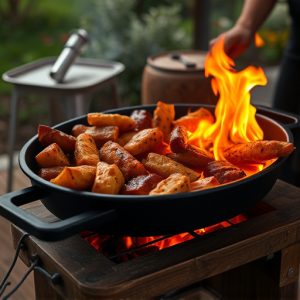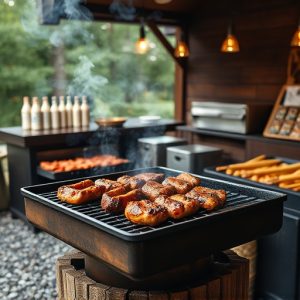Mastering Sweet & Smoky BBQ Jerky: Comprehensive Guide
Crafting the perfect BBQ jerky involves selecting high-quality, lean cuts of meat like round steak or sirloin for tenderness. Season with a blend of salt, pepper, liquid smoke, and brown sugar for classic flavor. Dry rubs with paprika, brown sugar, garlic powder, and onions enhance smokiness; experi…….
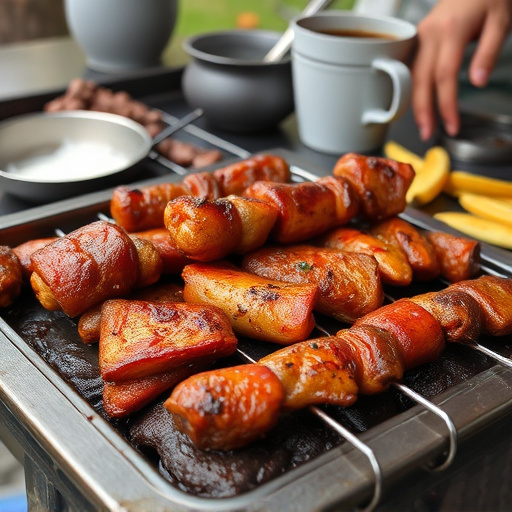
Crafting the perfect BBQ jerky involves selecting high-quality, lean cuts of meat like round steak or sirloin for tenderness. Season with a blend of salt, pepper, liquid smoke, and brown sugar for classic flavor. Dry rubs with paprika, brown sugar, garlic powder, and onions enhance smokiness; experiment with chili, cumin, or cayenne for unique twists. Marinades made with soy sauce, brown sugar, garlic, or whiskey add depth; let marinate for tender strips. Smoke at 225°F – 250°F (107°C – 121°C) using hardwoods like oak, hickory, or mesquite for distinct tastes. Store jerky in airtight containers for up to 3 weeks. Use SEO keywords like 'BBQ Jerky Recipe' for culinary inspiration.
Unleash your inner grill master with our comprehensive guide to crafting the perfect sweet and smoky BBQ jerky. From selecting the ideal cut of meat to mastering dry rubs, marinating techniques, and smoking at the right temperature, we’ve got you covered. Learn how to choose the best wood for a flavorful finish and discover tips for achieving that elusive balance between sweet and smoky. Plus, explore creative variations to take your homemade BBQ jerky recipe to the next level.
- Selecting the Right Cut of Meat for BBQ Jerky
- Dry Rubs: The Heart of Smoky Flavor
- Marinating Techniques to Enhance Taste
- Smoking at the Perfect Temperature
- Choosing the Right Wood for Smoked Jerky
- Packaging and Storing Your Homemade BBQ Jerky
- Tips for Achieving a Perfectly Balanced Sweet and Smoky Flavor
- Creative Variations of Classic BBQ Jerky Recipes
Selecting the Right Cut of Meat for BBQ Jerky
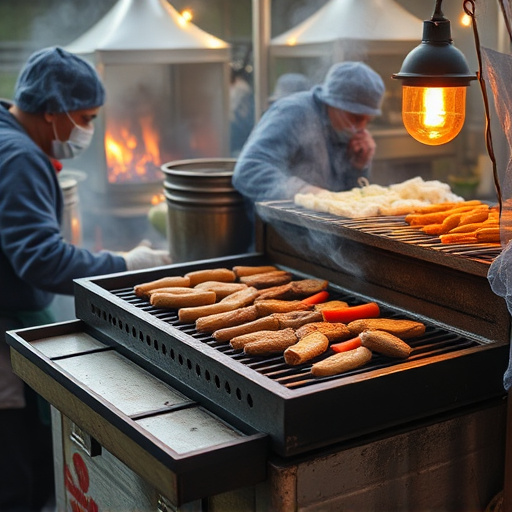
When preparing sweet and smoky BBQ jerky, selecting the right cut of meat is crucial for a delicious end product. Opt for lean cuts like round steak or sirloin as they have less fat content, ensuring your jerky stays crispy rather than greasy. Look for a tender cut that will easily break down during the long marinating and drying process, allowing each bite to be flavorful and satisfying.
In terms of BBQ jerky recipe, consider using a combination of salt and pepper for a basic seasoning, then enhance with liquid smoke and brown sugar for that signature smoky-sweet flavor. Remember, the quality of your meat is key; choose a good cut to elevate your home-made BBQ jerky experience.
Dry Rubs: The Heart of Smoky Flavor
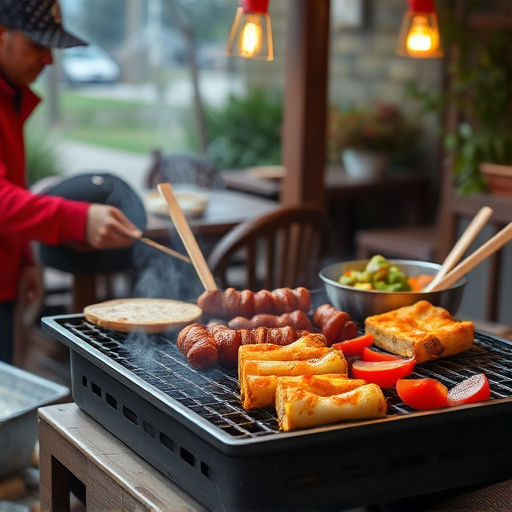
Dry rubs are an essential component in crafting the perfect sweet and smoky BBQ jerky. These aromatic blends of spices, sugars, and seasonings are what give your jerky that signature savory kick. When it comes to BBQ jerky recipes, the dry rub acts as the heart of the dish, infusing each piece of meat with a complex flavor profile.
The beauty of dry rubs lies in their versatility and adaptability. You can customize them based on personal taste preferences or regional BBQ traditions. Common ingredients include paprika, brown sugar, salt, pepper, garlic powder, and onions, but feel free to experiment with different spices like chili powder, cumin, or even a pinch of cayenne for an extra kick. Apply the dry rub generously to your jerky meat before marinating or immediately after, allowing the flavors to penetrate and create a delightful contrast between sweet and smoky notes.
Marinating Techniques to Enhance Taste
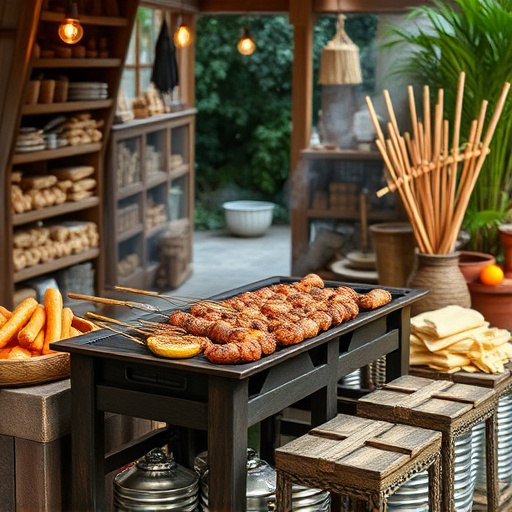
Marinating is a crucial step in preparing mouthwatering BBQ jerky, as it significantly enhances the flavor profile and overall taste experience. For a truly exceptional BBQ jerky recipe, experiment with various marinades to find your perfect blend. A simple yet effective method involves combining ingredients like soy sauce, brown sugar, garlic, and paprika for a sweet and smoky profile. Letting the meat sit in this marinade for several hours allows flavors to penetrate deep into the muscle fibers, transforming them into tender, flavorful strips.
Alternatively, for a more complex twist, incorporate ingredients such as whiskey or bourbon, smoked paprikas, and a touch of chili powder. These additions impart rich, subtle smoky notes and a hint of heat that dance on the palate. The key is to tailor the marinade to your taste preferences, ensuring it complements the quality of your chosen cut of meat for an unforgettable BBQ jerky experience.
Smoking at the Perfect Temperature
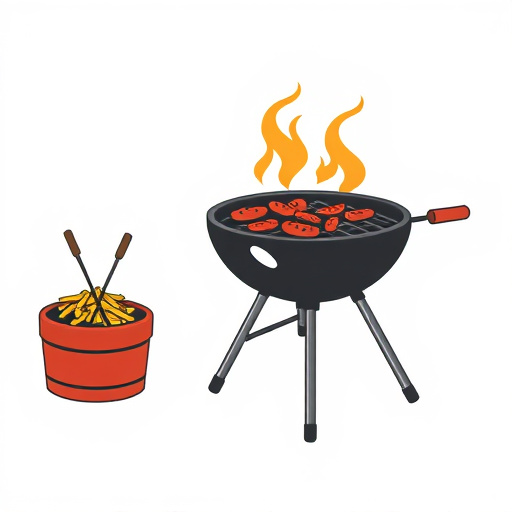
Smoking at the perfect temperature is key to achieving that sweet and smoky flavor in your DIY BBQ jerky recipe. For best results, aim for a consistent temperature range between 225°F – 250°F (107°C – 121°C). This slower cooking process allows the meat to break down gently, ensuring a tender texture and deep, rich flavor. Maintaining this ideal range prevents overcooking, which can lead to tough jerky, while also encouraging the caramelization of sugars, resulting in that delectable smoky taste.
Invest in a good quality smoker that allows for precise temperature control. Whether it’s a charcoal, gas, or electric model, regular checks and adjustments will ensure your jerky cooks evenly. This meticulous approach will pay off with a batch of mouthwatering, perfectly prepared BBQ jerky that satisfies both your sweet tooth and your desire for smoky goodness.
Choosing the Right Wood for Smoked Jerky
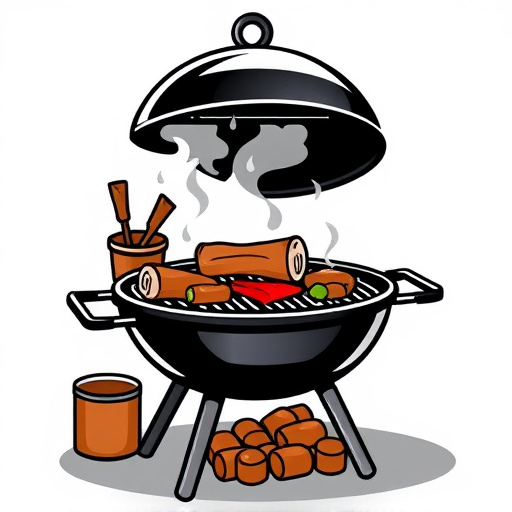
When preparing sweet and smoky BBQ jerky, choosing the right wood is crucial for achieving that perfect flavor profile. The type of wood used significantly influences the taste, aroma, and overall quality of the final product. For a classic BBQ jerky recipe, opt for hardwoods like oak, hickory, or mesquite. These woods impart a robust, smoky flavor that’s characteristic of traditional BBQ. Oak, in particular, offers a subtle sweetness that pairs well with the savory notes of the meat.
Each wood variety adds unique nuances to the jerky. Hickory, for instance, is known for its intense smoke flavor, while mesquite contributes a slightly sharper, more distinct smoky taste. Experimenting with different woods allows you to customize your BBQ jerky recipe to suit personal preferences. Remember, the key is balance—you want enough smokiness without overwhelming the natural meat flavors.
Packaging and Storing Your Homemade BBQ Jerky
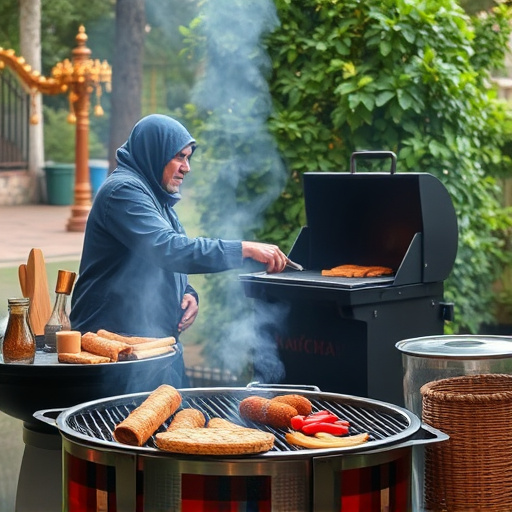
After your sweet and smoky BBQ jerky is perfectly marinated and cooked, it’s time to package and store it properly. This ensures that each bite maintains its delicious flavor and texture. Use airtight containers or resealable bags designed for storing food, as they lock in moisture and prevent exposure to air, which can cause the jerky to dry out or spoil. Label your containers with the date of preparation, especially if you’re making a large batch, so you know how fresh each serving is.
Store your homemade BBQ Jerky in a cool, dark place, such as a pantry or refrigerator. Although it can typically last for several weeks when kept properly, for maximum freshness, consume within 2-3 weeks after preparation. This is especially important if you’ve used fresh ingredients and avoided adding preservatives to your BBQ Jerky Recipe. Regularly check the jerky for any signs of spoilage before consuming, ensuring you always enjoy a safe and delicious snack.
Tips for Achieving a Perfectly Balanced Sweet and Smoky Flavor

To achieve a perfectly balanced sweet and smoky flavor in your BBQ jerky recipe, start by marinating your meat in a combination of liquid smoke, brown sugar, and a touch of molasses. This trio creates a rich, complex taste profile that’s essential for great jerky. The liquid smoke imparts that distinctive smoky flavor, while the brown sugar adds a sticky sweetness that coats each piece evenly. Molasses contributes a deeper, more intricate sweetness that enhances the overall flavor profile.
During the cooking process, use a slow cooker or dehydrator to gently cook the meat at low temperatures. This method allows for even drying and helps preserve the sweet and smoky flavors. Regularly baste the jerky with your marinade as it cooks to ensure every piece absorbs the delicious flavors. Experimenting with different types of wood chips in your smoker can also add subtle variations to the smoke flavor, so feel free to try oak, hickory, or mesquite for unique tastes.
Creative Variations of Classic BBQ Jerky Recipes
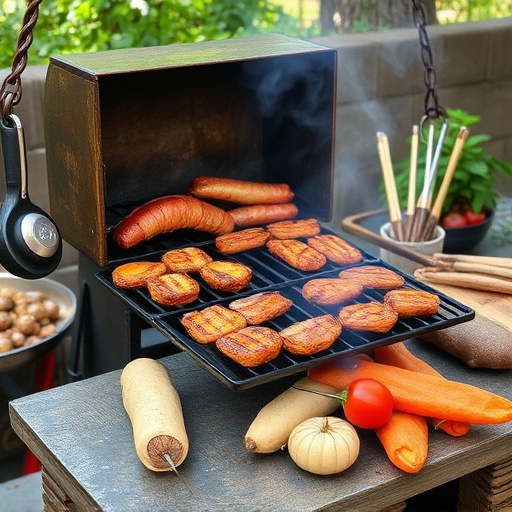
BBQ jerky, a classic protein snack, offers endless creative possibilities for culinary adventurers. While traditional recipes often lean on smoky, savory flavors, variations abound to satisfy diverse palates. Spicy BBQ jerky, for instance, adds a kick with chili powder or cayenne pepper, appealing to those who enjoy a bit of heat. For a sweeter twist, incorporate brown sugar or maple syrup alongside BBQ sauce, creating a delightful balance between caramelized sweetness and smoky tang.
Don’t be afraid to experiment with international influences; consider adding Asian flavors like soy sauce, ginger, or chili garlic paste for an umami-rich profile. Or, go Mediterranean with dried herbs such as rosemary, thyme, and oregano, offering a distinct aroma and taste. These creative BBQ jerky recipes not only cater to varied tastes but also showcase the versatility of this timeless snack.
